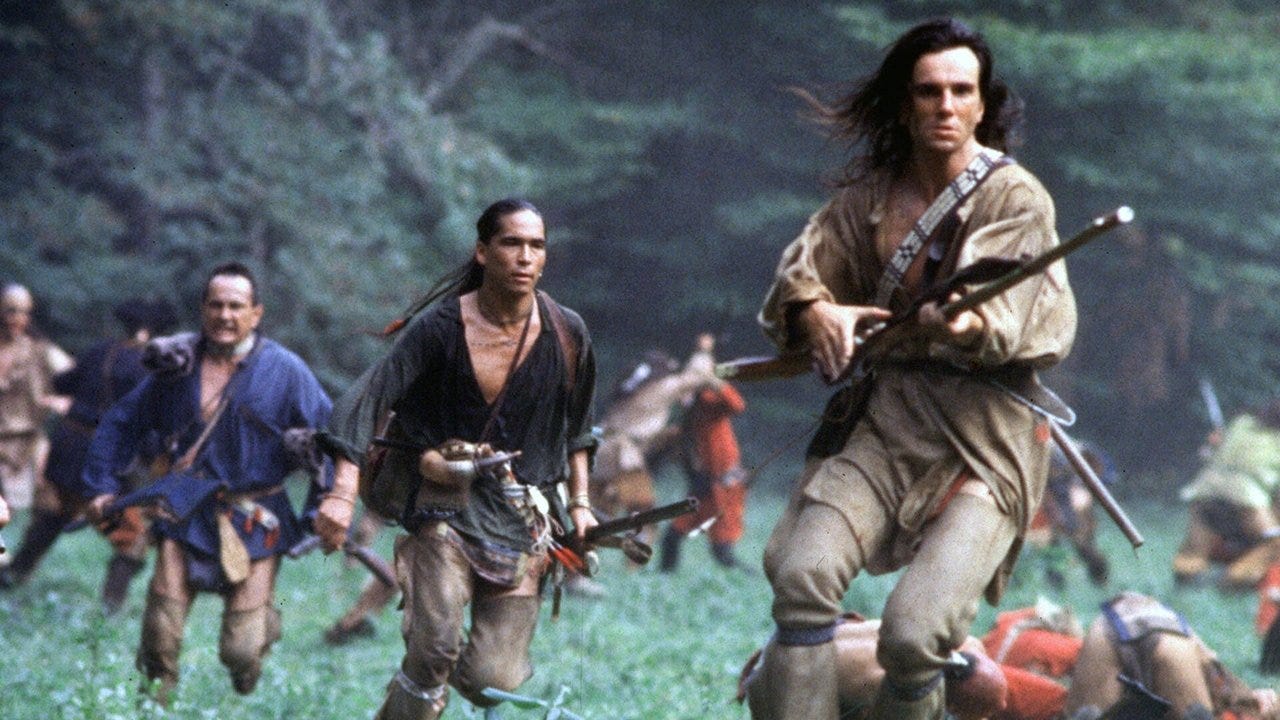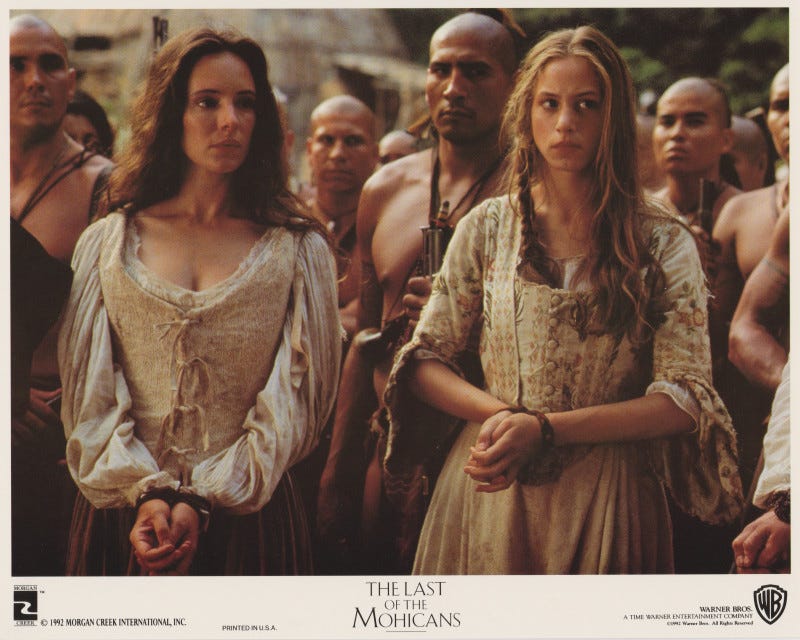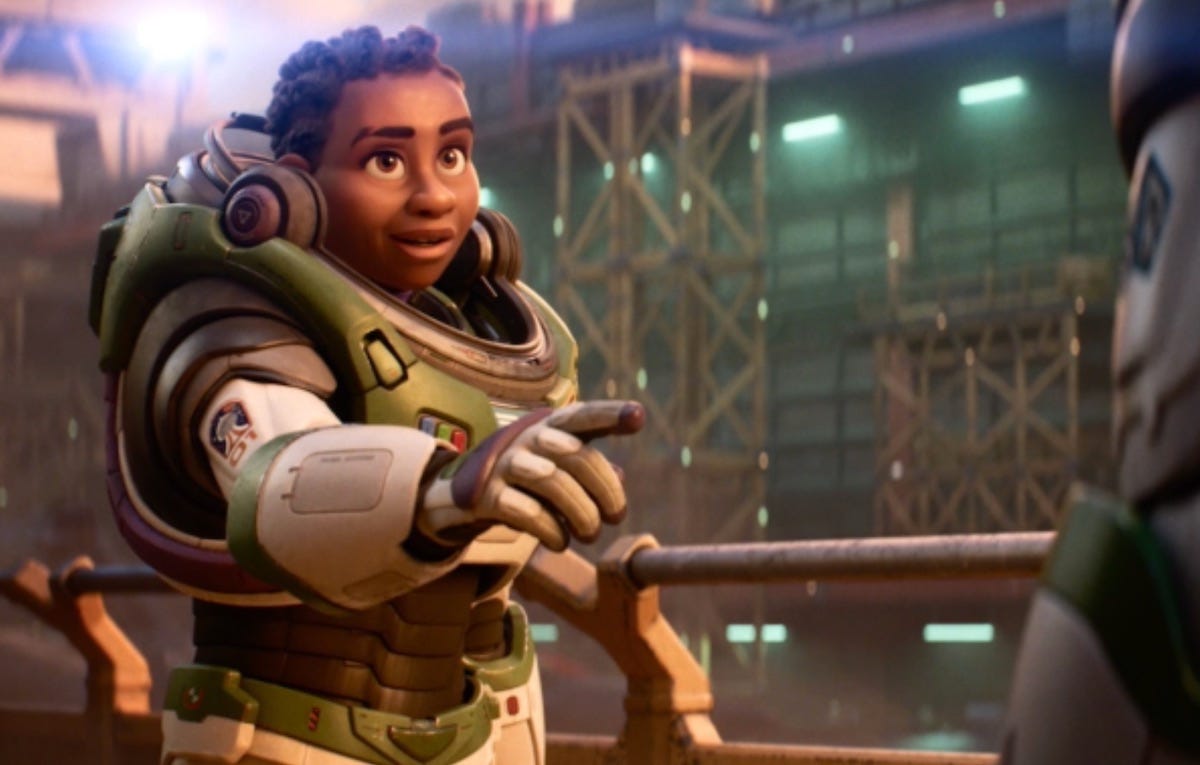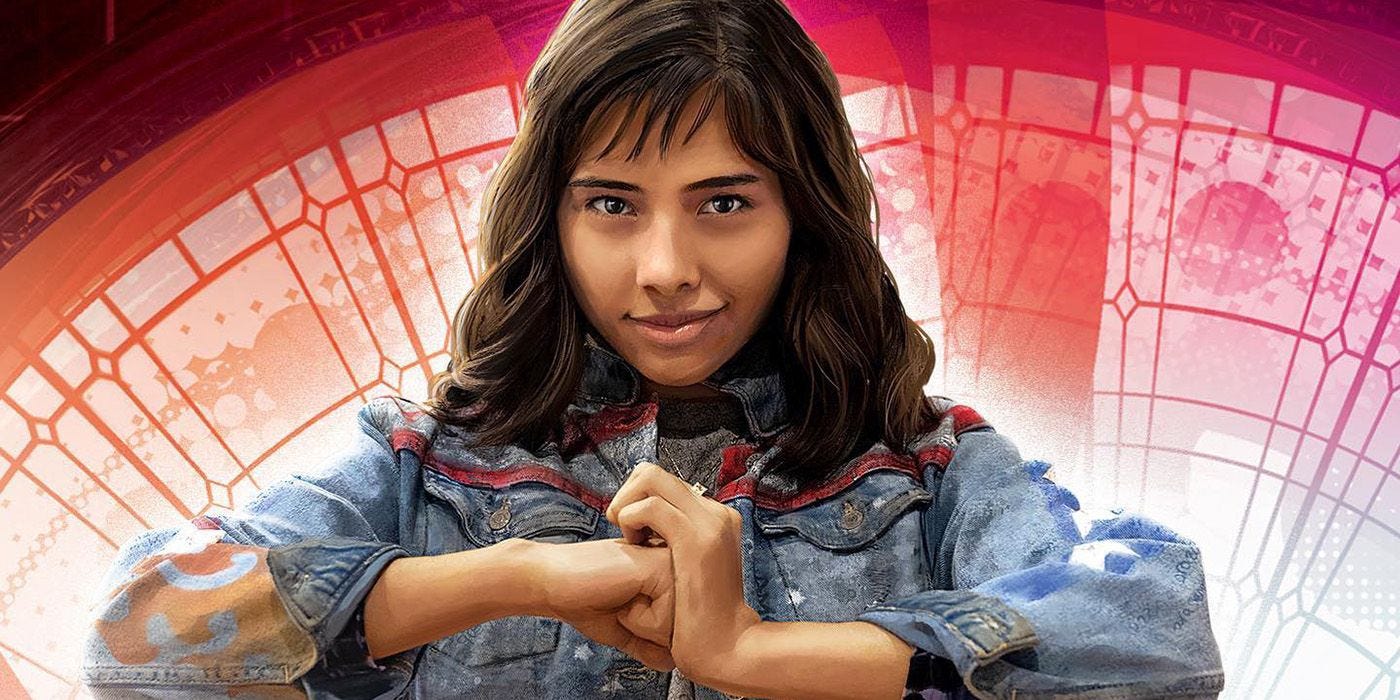It’s been 5 years since 2020. Why are major films and streaming series still so deliberately, obnoxiously bad?
I rewatched The Last of the Mohicans recently. What a film! Not only does it have heroism and drama and moral dilemmas (real moral dilemmas, ergo real morality), and accurate-feeling close-quarters combat scenes and artillery bombardments, but it has gentle and feminine leading women. It has (white!) colonial frontiersmen making sophisticated ethical arguments and asserting their love for honor and liberty above all:
Ian: What do we do about being under Crown law?
Jack Winthrop: l believe: if they set aside their law as and when they wish, their law no longer has rightful authority over us. All they have over us then is tyranny. And l will not live under that yoke.
I was quickly seized by a realization: Hollywood neither would nor could ever make a film like this today. It’s an adaptation of the James Fenimore Cooper novel, of course, but even with access to the original source materials, modern studios would simply find themselves unable to resist meddling with the character and plot mechanics. They would make something more appealing to the mythical ‘modern audience’ and therefore something that would be cheaper, less compelling, and sillier. Such is the touch of modern writers. The ladies in the film (damsels who show intense moral courage and spirit at times, but who are historically accurate upper-class women) would be given a larger role - maybe as backwoods riflemen, or as British warrior-soldiers revered by the Huron. They’d definitely do some fighting (meaning: they would fight professional soldiers and grizzled frontiersmen and French riflemen, and they would win). Rather than jumping off a cliff to escape the indignity of slavery at the hands of Magua, Alice Munro would doubtless execute a flying armbar on Magua and, after dislocating his shoulder, make some tough quip. I’m only half joking.
This wouldn’t be made today. If it was you can be sure there’d be some nonsensical racial or gender anachronisms, because that is most of what modern writers care about.
The issues in film and television production have been getting worse for some time. There has been a slight reprieve in the past year or two, it seems, but we’ve hit a kind of stalemate. We’re stuck at a point beyond which Hollywood will not travel: they simply will not return to strong male leads or heroism or compelling ethical dilemmas, not matter how much money is left on the table.
Major motion pictures have a drawn-out schedule. From dealmaking to theater release, it’s not abnormal for 2-3 years to pass. Sometimes it’s more like 10, or more. It’s no surprise that the cultural discombobulation of 2020 would take some time to work its way out of the cultural bloodstream. Do you remember 2020? Video games featuring prostitutes and aggravated assault removed police cars from their worlds (too offensive). Cops and a half dozen other cop shows went off air, as the entertainment complex decided to pretend that we were a society which didn’t need police (large parts of academia and the nonprofit sphere are still pretending). Racism hoaxes abounded. Winston Churchill’s statue in Great Britain was toppled (the fact that BLM was a potent force in Europe should put to bed any claim that this was tied to American racial dynamics).
The #MeToo era was a less destructive repeat, but it still unjustly ruined the lives of probably hundreds of men and created a new, celebrated, incoherent cultural narrative: women were brave for coming forward with allegations from years or decades before - even though they were showered with praise and celebration and had the sympathetic ear of journalists and prosecutors (which removes the risk, and hence the bravery). Women were just as well-suited for corporate and cultural dominance and power - but seemed especially prone to being sexually harassed and abused. Women didn’t want sexuality or sexual attraction to be used to advance their careers or win status - except for when they did. Of course, these contradictions stood for years, with the fiat of major cultural institutions behind them, because trying to work out these issues or ask these questions in public was a truly risky undertaking. It was the period of “this is right because we say so; you must say so too, or we may ruin you.” That’s not a solid foundation upon which to build cultural consensus, and after a few years the ‘consensus’ was revealed to be an illusion of compelled and fearful conformity, not real agreement.
On top of all of the insanity, the quality of films and shows cratered.
I was inspired to write this after details of the new Fantastic Four film (Fantastic Four: First Steps) leaked out. I was determined to give the entertainment industry a grace period. In spite of their conceited natures and general sense of moral certainty, these people are not educated or curious and they rarely seem to be wise. Atop all of that, they are some of the most ludicrously naive, disconnected human beings that have ever existed. I hoped that they would respond to market incentives. They would never renounce their old loyalties, or even admit that their approach had changed (that requires realism and humility), but perhaps they could slowly return to making good movies?
Perhaps not.
writes:A new trailer has been released for the upcoming Fantastic Four: First Steps, brought to you by the Marvel Cinematic Universe geniuses behind such box office bombs as Immortals, The Marvels, and Captain America 4: The One Without Captain America in It. As a result, hopes that someone, anyone can ever get this particular superhero team right are fading, fast….
Hurried reshoots just weeks ahead of release, reportedly due to poor test audience reactions, have fed critics’ speculations that the film has been too damaged by woke programming to succeed at the box office. Which is a shame, really. The tattered remnants of comic book fandom really wanted this film to be good. Unfortunately, it does not look good.
Entertainment can be loosely organized into genre categories. Some of the most profitable ones, with nearly universal age-appropriate appeal, are historical epics, superhero films, big budget children’s movies, comedies and romantic comedies, etc. All of these categories have been radically altered by our cultural drift. Children’s films have been an irresistible opportunity for writers and studios to try to imprint their ideas of morality and proper social attitude on the young (there’s nothing strange about having two mommies).
Buzz Lightyear’s Commanding Officer, because of course she is
Comedies and romantic comedies have died or gotten smaller, as progressive creatives have begun to decide that comedy is much less emotionally satisfying than righteous anger, and that romance entails problematic overtones of heteronormativity. I will be focusing here on what was traditionally the main money-maker for Hollywood: epic and action films with male leads (and a female romantic interests). Those are the kinds of films we (meaning the American public) want to see. Alien, The Terminator, The Patriot, Braveheart, Captain America, etc.
One interesting note: Alien actually had a female protagonist, Lt. Ellen Ripley, who was better written than just about any leading women in the past decade. Her motivations were understandable and sympathetic, and she was driven to the heights of murderous, anti-xenomorph aggression through her defense of a lost little girl, Newt. This is a learning opportunity for modern entertainment writers: characters work better when they reflect human nature. Women will tend to be driven to violence more in defense of family and children (although the Marine heavy machine gunner in that film was also a woman - but a kind of oddity). If you write women as competitive, haughty, and aggressive in a masculine way, you won’t be changing anyone’s ideas of femininity. You’ll just be making a bad and silly movie.
The Marvel Cinematic Universe (MCU)’s last completed iteration was ‘phase four.’ Phase four had seventeen female protagonists out of twenty-two films. That means that in a multi-billion dollar genre, which is mostly popular among men (and boys), the producers made a deliberate and systemic effort to promote female characters. Were they compelling? Watch The Marvels, and you tell me. In many of the remaining films prominence was given to black characters (at the expense of lore integrity, or white characters, like in the last Captain America) and awkward political ‘lessons’ were forced in:
America is a racist country in which no black man would want to be Captain America
Terrorists who kill people in bombing campaigns shouldn’t be called terrorists if their hearts are in the right place
Immigrants (immigrant girls, more specifically) are awesome
The last Doctor Strange film might have had his name in the title, but the real protagonist was America Chavez, an immigrant girl whose powers were so awesome and unique that she was essentially alone in the multiverse (don’t think too hard about it). The producers could have given the fans what they wanted but they decided to give them what they SHOULD want…
The MCU is now (appropriately, I’d say, given the statistics) called the ‘M-She-U’ by fans. If you want a good laugh, check out some trailers or reviews of the new MCU production Ironheart, about a black female teenage genius (smarter than Tony Stark, and even more arrogant) as she defies stereotypes and does a lot of genius-type stuff, while being black (or what a Hollywood writer’s idea of ‘black’ is).
Still, many of the products went into production nearer to 2020 than today, so I was willing to let bygones (or, ridiculous and unnatural progressive social fantasies) be bygones.
Back to Fantastic Four (which is in a different comic book universe than the MCU, I think, but still a huge potential money maker): this is a kind of last-ditch effort by the studio. If it’s well-made and popular it could earn over $1 billion. The studio knows what the public wants: strong male leads, feminine women who add some emotional depth and compassion, a formidable antagonist, ethical clarity and good pacing and opportunities for audience emotional investment.
What will we get?
The rumors are that this film makes the Silver Surfer, one of the most mysterious and formidable antagonists in the comic book realm, a female (because of course it does). It made Reed Richards (played by Pedro Pascal, who everyone seems to be thoroughly tired of) a kind of beta male and a follower (not a leader, as in the comics) of Sue Storm. Also, Pascal is about 20 years older than the character he is supposed to be playing. Sue Storm - a sexy, young character in the comics - is played by an actress who’s 38 in real life (and doesn’t look any younger in the film). Naturally, she’s the real leader of the Four and, according to her, the film takes a critical look at the “gender politics” of the 1960’s (the era the film is supposedly set in, although you can bet that few of the norms or values of the 1960’s will be accurately represented).
Entertainment Weekly changed their headline to quell the backlash. These people just can’t help themselves.
It’s not certain that this film will be bad. Perhaps the rumors are overblown. Perhaps it will be well-written. The point is that there are tens of millions of potential viewers out there that have been profoundly turned off by these kinds of themes and narrative tweaks. Any film looking to clean up at the box office should be working extra hard to reassure these people. Instead, we see indications of the same old routine: a conception of gender roles and characterization and thematic purpose which are beloved by a relatively small number of educated, well-off, young urban folks, and no one else. These indications lead many to suspect that the film will have the same limp, CGI-heavy action sequences, and faux-ethical ambiguity (really just a kind of soggy relativism, created by people who’ve never had to face real danger or contemplate real moral tradeoffs), and an approach to heroism and patriotism and our debt to our ancestors which is exhibited by so many modern productions.
What explains this intransigence, this stubborn refusal to give the people what they want? Is it really stubbornness, or is it incompetence?
I’d say it’s a bit of both. Hollywood and streaming services have been ruthlessly winnowed (in reverse - the wheat is cast into the fire and the chaff is gathered up and rewarded handsomely) by DEI. This means that writers rooms are full of progressives, people preoccupied with race and gender and other constructs beloved by modern leftists. The rooms are full of large children, people without any real experience of war or committed romance or loss or dilemma. To them ‘romance’ means hookup culture, and ‘war’ means snarky words on Twitter. I’m not exaggerating. The rooms are full of people who are thoroughly disconnected from real life and real people.
Just as many institutions and the people who staff them see issues like ‘trans rights,’ or immigration, as simple moral problems (not knowing any working-class people, and being unwilling to read or watch any content which might enlighten them as to the policymaking complexities of these issues), so do these writers see reality. This is a deeper problem than studio direction or marketing. It involves the basic assumptions and core cultural values of the creatives who work on these projects. These creatives can’t really back off of their beliefs, because that would involve admitting that their assumptions might not be true or their values appropriate. We’re seeing this problem in every major intellectual sector of American life.
People with faulty and overly simplistic assumptions about evil, personal responsibility, gender roles, achievement, and righteousness cannot help but make bad policy and teach bad lessons and create bad science, at least sometimes. They can’t help but make bad films either.
Maybe you can name the well-written and compelling and much-loved film or series that is thoroughly progressive? Can you think of one? Either something is wrong with the audience (which isn’t a possibility studio executives can consider - the audience is king in their world) or something is wrong with the ideas.
I would bet on the latter option.















And here I thought that I didn't like movies anymore, because I was racist, sexist and bigoted.
"Maybe you can name the well-written and compelling and much-loved film or series that is thoroughly progressive?"
I'm thoroughly conservative, but the 'go to' example I usually hear from progressives is Star Trek, and I'm inclined to rate that claim as "Partly True" (only partly, because they generally don't recognize that a lot of Classic Trek episodes are rather thinly reskinned versions of very old and traditional stories, so pointing at Uhura as 'representation done right' only gets them so much credit).